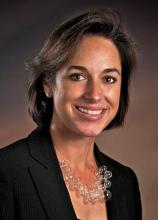WASHINGTON – Dr. Karen B. DeSalvo feels your pain.
As the government’s National Coordinator for Health Technology, Dr. DeSalvo says that she wants to redouble efforts to help all physicians adopt electronic health records (EHRs).
"We really want to help," Dr. DeSalvo said at a Feb. 5 forum on telemedicine sponsored by the journal Health Affairs. "We want to bring folks along," and ensure there is not a digital divide.
But her primary focus is interoperability.
Achieving interoperability "is going to be a complex and exciting endeavor," that will be not only about the basics of making it work, but also pulling all the stakeholders together to brainstorm creative solutions, Dr. DeSalvo said Feb. 6. at a health IT conference, sponsored by West Health Institute and the Office of the National Coordinator.
Dr. DeSalvo has experience in creating interoperable systems. After Hurricane Katrina, Dr. DeSalvo, then chief of general internal medicine and geriatrics at Tulane University and special assistant to its president for health policy, helped resurrect New Orleans’s health care system.
Paper records were lost or destroyed. Many patients were displaced and had patchy recollections of their medical histories. Health care professionals too were displaced; those that remained decided to "take this tipping point and move forward," she said. That meant building a new infrastructure – one that would be portable and easily accessible to providers and patients.
Health IT played a huge role in helping the city regain its medical bearings. "We skipped right to ... electronic health records and how we could use telehealth," Dr. DeSalvo said. Use of EHRs allowed physicians to quickly transition their practices into patient-centered medical homes and also meant that patients would be treated holistically, she said. Interoperability was key.
Although America "is not facing the urgency of a catastrophe like Katrina," she said, "it is at a slow boil," with costs continuing to rise and ongoing challenges with access to care and quality improvement.
On Twitter @aliciaault


